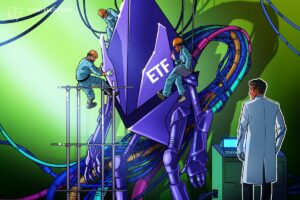A rug pull is a type of scam where developers abandon a project and take their investors’ money.
What Is a Rug Pull?
The definition of a rug pull is a malicious maneuver in the cryptocurrency industry where crypto developers abandon a project and run away with investors’ funds. Rug pulls usually happen in the decentralized finance (DeFi) ecosystem, especially on decentralized exchanges (DEXs), where malicious individuals create a token and list it on a DEX, then pair it with a leading cryptocurrency like Ethereum.
Rug pulls thrive on DEXs because these types of exchanges allow users to list tokens for free and without audit, unlike in centralized cryptocurrency exchanges. Furthermore, creating tokens on open source blockchain protocols like Ethereum is easy and free. Malicious actors use these two factors to their advantage.
Note that decentralized exchanges such as Uniswap algorithmically determine the prices of tokens in a pool depending on the available balances. To ensure you don’t fall victim to a rug pull, check the liquidity in a pool. However, this is only the first step. You must also check if there is a lock on the token’s pool. Most reputable projects lock pooled liquidity for a certain period.
Another major characteristic of a possible rug pull is a coin skyrocketing in price within hours. For example, a rug pull coin can move from 0 to 50X within 24 hours. This trick is meant to drive FOMO that leads more people to invest in the token.
What Does Being Rug Pulled Mean?
The definition of being rug pulled is as such: the developers behind a project would extensively promote the launch of their new project, usually through crypto influencers, and typically make bold promises of 100X returns or more — targeting “investors” seeking quick riches.
Then, these developers would list their token and create a pool on decentralized exchanges like Uniswap or Pancakeswap, which allows anyone to do so.
Once a significant amount of unsuspecting investors swap their ETH for the listed token, the creators then withdraw everything from the liquidity pool, driving the coin’s price to zero. The coin’s creators may even create a temporary hype around Telegram, Twitter, and other social media platforms and initially inject a substantial amount of liquidity into their pool to cultivate investor confidence.
Rug pulls may occur shortly after a project’s launch, or it may play out over a longer period of time, extending the investors’ misery.
What Is an NFT Rug Pull?
The definition of a non-fungible token (NFT) rug pull is similar to a typical rug pull on a DeFi project. In the case of a NFT rug pull, it typically involves a NFT collection, such as a profile picture (PFP) collection. During the pre-launch phase, the developers and creators behind the NFT collection would seek to attract early “minters” by excessively promoting it, usually on social media through crypto influencers. Many NFT collections also require users to get on the “whitelist” to be able to mint — further driving the exclusivity of the NFT collection.
Once the NFT project launches and users mint the collection — usually at a set price — the developers may transfer the funds out of the ecosystem and vanish, effectively executing a NFT rug pull. Creators may also wait for the NFT prices to rise to a certain level before siphoning all the funds from the community.
What Does an Unruggable Project Mean?
In order for a project to be deemed “unruggable,” it means that there aren’t a significant amount of tokens help by the development team. Without the signature large amount of team-held tokens that could be taken in a rug pull or exit scam, a project could be considered unruggable.
Another way to think about an unruggable project is if the team renounces ownership of any tokens, like tokens they would have acquired during a presale.




